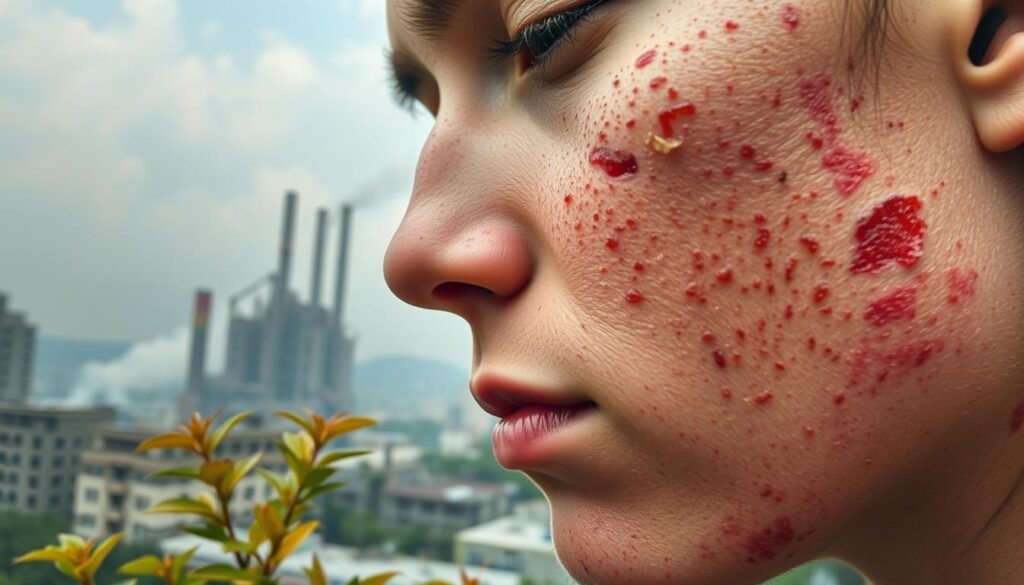About 85% of people aged 12 to 24 get acne at some point. This shocking fact shows why it’s key to know what triggers acne. It’s not just about looks; acne can hurt your mental health and confidence. Finding out what causes acne is a big step in dealing with it. This article will help understand acne and what leads to it.
Key Takeaways
- Understanding common acne triggers is essential for effective management.
- Acne affects a large percentage of adolescents and young adults.
- Emotional well-being can be heavily impacted by the appearance of acne.
- Multiple factors contribute to breakouts, including hormones and diet.
- Knowledge of acne triggers can lead to better skincare choices.
Understanding Acne: A Brief Overview
Acne is a skin issue many people face, especially in their teen and young adult years. It happens when oil glands work too much and block hair follicles. This results in pimples, blackheads, and sometimes cysts.
Acne comes in various types. The most common type is acne vulgaris, which includes whiteheads and blackheads. Cystic acne is more intense, causing painful, swollen cysts that may scar. Women might experience hormonal acne due to changes in their bodies.
Knowing what causes acne helps in dealing with it. Things like hormone changes, diet, and the environment play a role. By understanding these factors, individuals can find the right treatments. This understanding leads to better skin care and health.
Common Acne Triggers
Dealing with acne can be tough. By knowing what causes it, you can fight breakouts better. Mainly, hormones and what you eat play big roles.
Hormonal Changes
Changes in hormones are a top reason for acne. When you go through puberty, have your period, get pregnant, or hit menopause, your skin might get oilier. This can clog pores. Androgens, hormones that up oil production, also make acne worse. Managing acne during these times is key.
Dietary Factors
What you eat affects acne too. Eating lots of sugar, dairy, and certain fats can make it worse. These foods cause inflammation, which might lead to more pimples. For more details on what triggers acne, click here.
| Hormonal Changes | Dietary Factors |
|---|---|
| Puberty increases oil production. | Sugar intake can lead to inflammation. |
| Menstrual cycles often trigger flare-ups. | Dairy products may aggravate acne symptoms. |
| Pregnancy leads to changes in hormone levels. | Certain fats can exacerbate breakouts. |
| Menopause can cause a resurgence of acne. | Dietary inflammation can result in skin issues. |
Stress Management and Its Impact
Stress affects our skin more than we might think. High stress leads to more cortisol, a hormone. This hormone makes our skin oily, leading to blocked pores and spots.
When stressed, our body might get inflamed. This makes acne worse. Managing stress is key for clearer skin.

There are many ways to tackle stress. Mindfulness, like meditation or deep breathing, can help lower stress. Physical activities are great too. They reduce stress and boost health.
Getting enough sleep is crucial for stress management and skin health. Good sleep helps the body maintain hormonal balance which benefits our skin. With these strategies, our mental and skin health can improve.
Hygiene Habits: Good and Bad Practices
Maintaining good hygiene is key to preventing acne. It’s important to have a skin cleaning routine. Gentle cleaning is better than harsh scrubs. These can cause more irritation and acne. Knowing the right hygiene balance helps get clear skin.
The Role of Cleaning Routines
Washing your face regularly helps keep pores clear. Using a gentle cleanser for your skin type removes dirt and oil. This should be done every day. It’s not just about your face; your whole body matters. Showering after sweating stops bacteria and sweat from causing acne.
Skin Care Products to Avoid
Choosing the right skin care products prevents breakouts. Avoid products that clog pores and worsen acne. Look for non-comedogenic options to avoid skin irritation. Reading labels helps. Select products suited to your skin type for better health. Check out these skin care products.
| Good Hygiene Habits | Bad Hygiene Habits |
|---|---|
| Gentle cleansing daily | Using harsh scrubs |
| Showering after workouts | Not washing the face before bed |
| Choosing non-comedogenic products | Using heavy oils or creams |
In conclusion, good hygiene habits and the right skin care products are crucial for preventing acne. Cleaning your skin regularly and avoiding harmful products make your skin healthier and clearer.
Medications That May Cause Breakouts
Some people don’t know that certain meds can cause acne. Knowing the possible Medication Side Effects is key when you’re starting new treatments. Medications that change hormone levels or make you produce more oil can cause problems.
Corticosteroids, used for inflammation, can lead to big acne problems. Antidepressants like tricyclics and some SSRIs might also cause acne. Plus, some birth control pills can mess with hormones and lead to acne.
Talking to your doctor before starting any new drug is important. They can tell you about Acne-Causing Medications and offer other options. Here is a list of meds that are known to cause acne:
| Medication Type | Examples | Common Effects |
|---|---|---|
| Corticosteroids | Prednisone, Hydrocortisone | Increased oil production, inflammation |
| Antidepressants | Amitriptyline, Fluoxetine | Hormonal fluctuations, skin changes |
| Hormonal Contraceptives | Ortho Tri-Cyclen, Yasmin | Hormonal imbalance, acne formation |
| Other Medications | Lithium, Isoniazid | Skin oiliness, pore blockage |
Knowing about these side effects lets people act early. Meeting with doctors regularly helps find the best treatment without hurting your skin.
Environmental Irritants and Acne
Many things in the environment can hurt our skin, especially when it comes to acne. Pollution can make skin problems worse. It leads to more oxidative stress and swelling. Pollutants like tiny particles and harmful substances can get into the skin, causing breakouts. Knowing how outside things can impact skin health is key.
Too much humidity can cause skin issues too. When it’s very humid, your pores can get clogged more easily. This makes it easy for acne to get worse. People who live in cities deal with more pollution. This mix of pollution makes it hard to keep skin clear.

To fight against these environmental challenges, it’s important to make some changes. Here are some helpful tips:
- Use non-comedogenic skincare products that won’t clog pores.
- Incorporate antioxidants into your skincare routine to fight oxidative stress.
- Establish a thorough cleansing regimen to remove dirt and impurities every day.
- Wear protective clothing to cover your skin from irritants when you need to.
- Stay hydrated to keep your skin moist and healthy overall.
Paying attention to these tips can really help your skin stay healthy. It can also cut down on acne problems caused by the environment.
Genetic Predisposition to Acne
Understanding the genetic link to acne helps us figure out why acne happens. Lots of research shows that if your family has acne, you might too. This means, if acne runs in your family, you could get breakouts more often and more severely.
Family History and Its Effects
If your family has a history of acne, you might find yourself dealing with it too. It’s all about genetics – they control how much oil your skin makes, your hormone levels, and how your body reacts to inflammation. Studies have found that:
- 50% of people with parents who had acne will likely get it themselves.
- Genes can make your skin more sensitive and less stretchy, affecting how it deals with things like dirt and bacteria.
- The traits you inherit can make your pores more likely to clog and help bacteria grow, leading to acne.
Even with a strong genetic connection, the right care can control acne. Customizing care to fit your genetic needs can make a big difference. Knowing your family history of acne helps you find better treatments and support.
| Factor | Impact on Acne |
|---|---|
| Oil Production | Increased likelihood of clogged pores |
| Hormone Levels | Higher risk during puberty and menstrual cycles |
| Inflammatory Response | More severe acne flare-ups |
Immune System Imbalances and Skin Health
Having a strong immune system is key for keeping your skin healthy, especially with acne. When the immune system is off balance, it can cause more inflammation. This inflammation can lead to acne because of how the immune system and acne are connected.
Stress, changes in hormones, and what we eat can mess with the immune system. This can make skin problems worse. Knowing how these affect acne can help us deal with them better.
Eating well is important for a healthy immune system. A diet full of antioxidants, vitamins, and minerals boosts immune function. Some foods cause inflammation, but foods like fish with omega-3 fatty acids can lower it. Changing what you eat can help your skin and control acne.
If you want to know more about what causes acne and how the immune system reacts, there’s a lot of research to check out. This knowledge lets you choose the best skincare and lifestyle habits. By living healthier, you help your body fight off acne better. More info can be found here: related to acne management.
So, to keep your skin great and fight acne, it’s important to balance the immune system. Eating right and living well can make your skin healthier.
Conclusion
It’s key to know the different factors that affect skin health to handle acne well. We’ve looked at how hormones, diet, and the environment can cause acne. It’s important for everyone to figure out what specifically triggers their acne.
Handling acne means knowing your triggers and taking good care of your skin. Managing stress, keeping clean, and knowing how your meds affect you are crucial. It’s about more than just treating acne; it’s about stopping it before it starts.
If acne keeps being a problem, a dermatologist can help with personalized advice. Learning more about what causes acne helps people make smart choices for better skin.